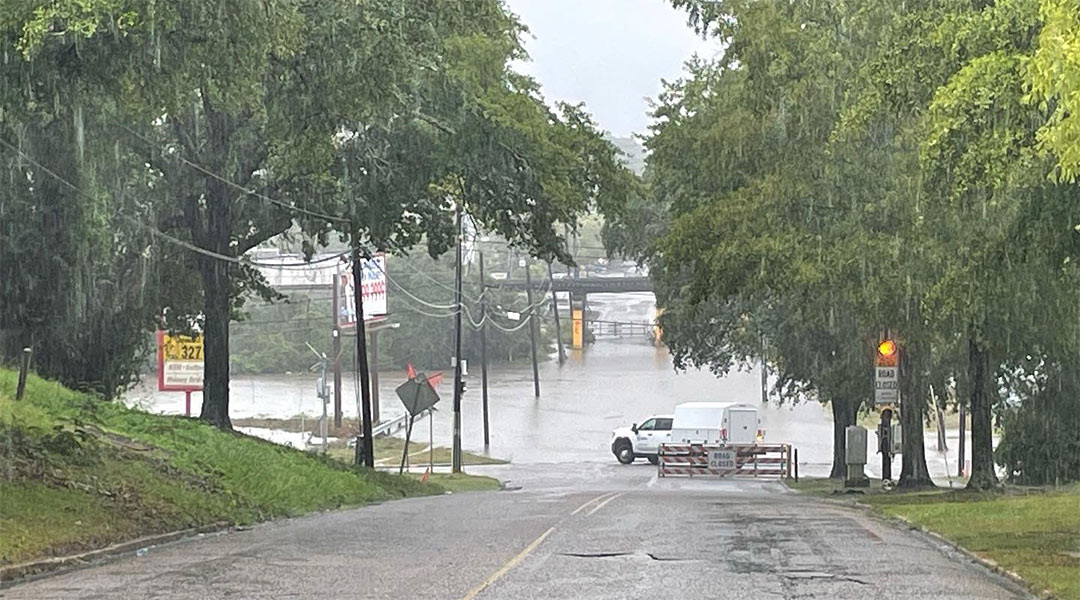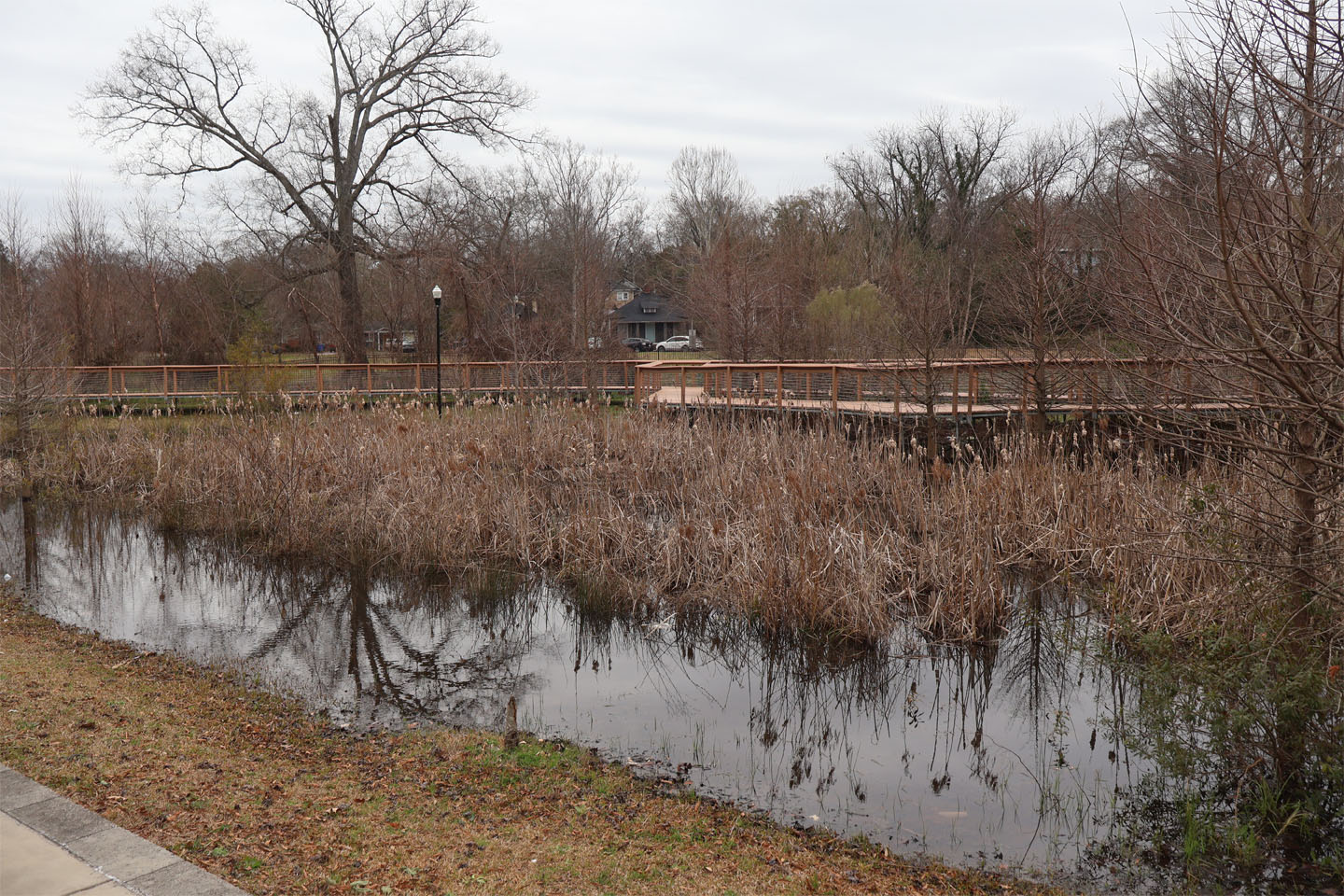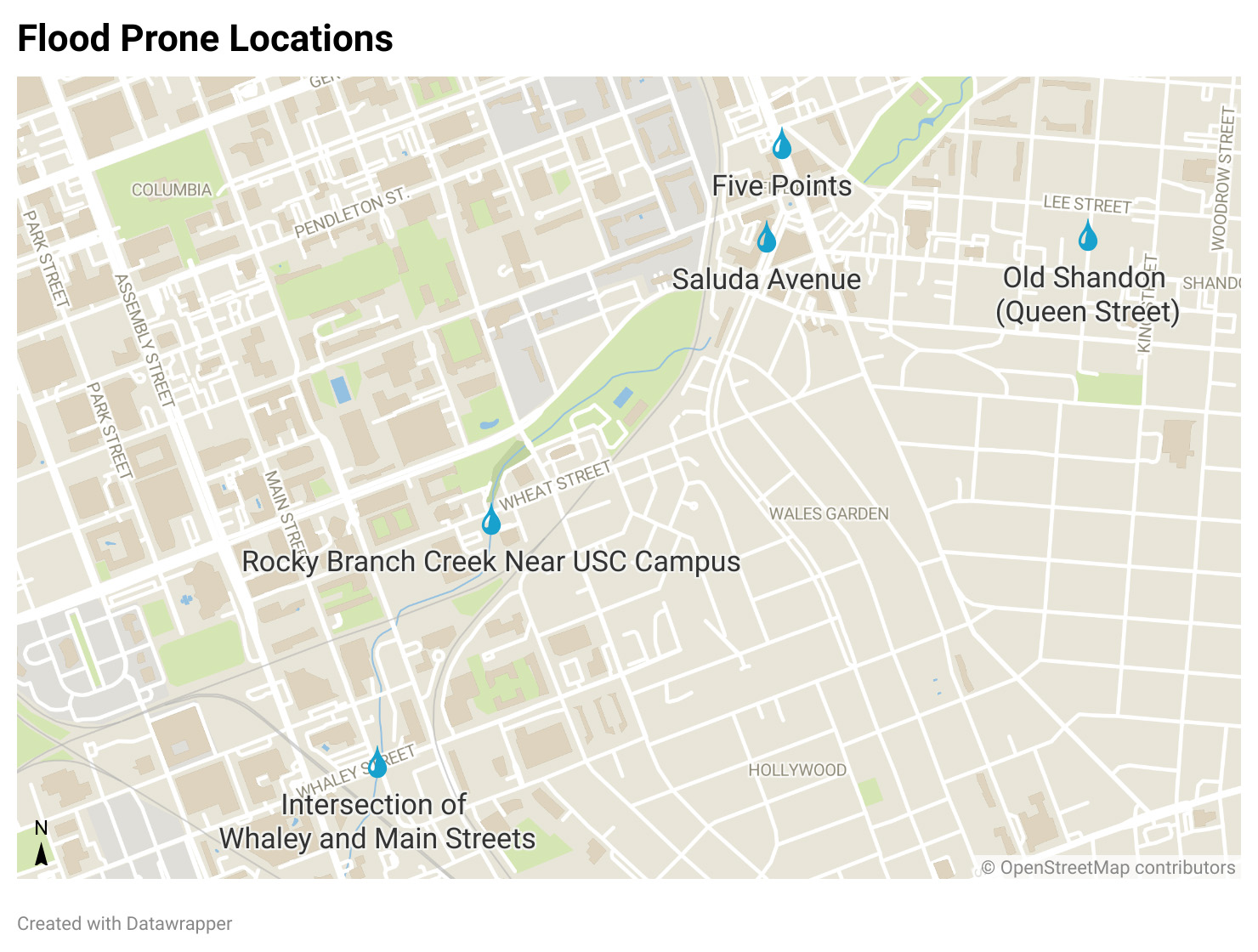Flooding at the intersection of Whaley and Main streets in September 2024 (Photo courtesy of Columbia-Richland Fire Department/Carolina News & Reporter)
Loose Lucy’s is a clothing store on the corner of Saluda Avenue near Blossom Street, full of colorful clothing and accessories.
But when heavy rain hits the Five Points area, one of the store’s co-owners said the floor becomes a “river.”
“We learned many years ago to not keep boxes, cardboard boxes full of merchandise, on the floor,” James McCallister said.
Five Points, a retail and entertainment district surrounded by a half-dozen hilly neighborhoods, is a low point in Columbia. The flood-prone Rocky Branch creek runs under some businesses and through the adjacent Martin Luther King Jr. Park.
For many people, Five Points is the most visible home to Columbia’s flooding issues. But the city’s water department is working to fix flooding at other crucial low-lying areas nearby – and has been hamstrung by obstacles that have caused delays. Meanwhile, cost estimates have soared.
Next door to Loose Lucy’s is Uniquely MC, run by Mary-Catherine Branch. Floods have resulted in damage at her business.
“We had to throw fabric away, and different things like that,” she said. “Minor things, like my ring light got ruined.”
The floods occur quickly and unexpectedly, leading business owners such as McCallister to be prepared, he said.
The geography and climate change
Recent severe weather has raised concerns over the potential for future floods in Five Points and along Rock Branch.
Susan Cutter is the director of the University of South Carolina’s Hazards Vulnerability and Resilience Institute. She said climate change may worsen flooding in Five Points.
“We used to think of these as relatively infrequent events, and now we see them not all the time but quite frequently,” she said. “And so, you’re not going to be able to change that in the short term. So, what you need to do to reduce the impact is to mitigate the impacts.”
Five Points sits on former swampland. Flooding in Five Points is largely due to urban development, Cutter said.
“Flash flooding, or urban flooding, and that’s a result of very intense rainfall happening very, very quickly,” she said. “And there’s no place for the water to go, because most of the area is cement. And the water cannot infiltrate into the groundwater.”
High intensity rainfall has occurred more often in the past two decades, and any drainage system improvements still might not be successful, Cutter said.
“With climate change, the increasing intensity of the rainfall could get to a point where it overwhelms these new storm drainage systems, because simply the pipe isn’t big enough to hold all the water and to move it quickly,” she said.
The MLK Park project
Columbia Water has attempted to mitigate flooding through stormwater projects along Rocky Branch.
Two of seven stormwater projects on Rocky Branch have been completed since City Council approved the projects in 2017.
The $1 million MLK Park detention project was completed in December 2018. The project installed two detention ponds and an engineered wetland in the city-owned park, said AJ Jessee, the project’s manager. The detention ponds hold water, while the engineered wetland is designed to allow water to flow and clean it of pollutants, he said.
The goal is to capture water from Rocky Branch that would otherwise flood Five Points downstream, he said.
“There’re two ways you can handle this,” he said. “Either you can make it where water flows more easily downstream from it, or you can try to detain the water or reduce the water flowing towards it from the upstream.”
The detention project at the park has successfully held back water and reduced flooding, based on the number of flood reports received, Jesse said.
Some property and business owners think the park’s detention project alone is insufficient. Richard Burts, owner of multiple buildings in Five Points, said Five Points needs more flood mitigating infrastructure installed. He believes these additions would prevent flooding.
Severe weather and quickly rising waters in Five Points in July 2022 left about 60 businesses with flood damage, and proved more work needs to be done, Burts said.
A quarter-mile away, up Blossom Street, a stormwater project is planned for the Maxcy Gregg Park area, according to the city’s Capital Improvements Program site. A project should be started now due to the available space there, McCallister said.
Additional projects, including work in Maxcy Gregg, will help alleviate these issues, Jessee said.
“There’re many different projects, and there are projects in the future that are going to help with it,” he said. “There is more that needs to be done that can be done.”
Unfinished projects
Several projects along Rocky Branch are unfinished, in part because of property acquisition and permitting issues.
The projects are the Queen Street stormwater improvements, Rocky Branch Saluda bypass, Rocky Branch Stream Restoration, Whaley and Main Improvements and the Maxcy Gregg Park Detention. The projects are estimated to cost between $2 million and $10 million each, according to the city’s Capital Improvements Program site.
All but the Queen Street project are in the design phase, Bryan said.
The funding comes from Columbia’s stormwater fee – charged to property owners, including nonprofits and houses of worship, which don’t pay property taxes – and Stormwater Bond Program. The base fee is $15.03 a month for single-family homes, according to Columbia Water’s site. The Stormwater Bond Program sold a total of $37.9 million in bonds to the public, according to Columbia Water communications manager Benjamin Wildt.
The Queen Street improvements
- The project would upgrade pipe sizes to relieve flooding and add a water detention basin, said Frances Bryan, an assistant city engineer with Columbia Water.
- Construction has been delayed due to difficulties in purchasing two vacant properties to host the water detention basin, she said. “We are currently waiting on a signature from one of the property owners,” Bryan said. “So unfortunately, it’s difficult to say exactly when it’ll happen, because it depends on something that’s outside of city control.”
- The design process was put on hold at 60% completion due to the purchasing issues, Bryan said. The engineering and consulting company, Black & Veatch, was contracted in 2020 for $247,800 to assist in design. The contract is still active, Bryan said.
- The project is estimated to cost between $7 million and $10 million, Bryan said. A July 2022 document from Columbia Water estimated the cost at $3 million. The increase is due to inflation and a materials shortage, she said.
The Whaley and Main improvements
- The project includes the addition of a larger culvert at the intersection. The structure would allow water to flow more easily under Whaley and Main streets, she said. The intersection of Whaley and Main streets has a significant flooding problem, Bryan said. In July 2022, a driver had to be rescued by specially trained firefighters after driving into the fast-moving flood waters at the intersection. Cars have been submerged there during other storms.
- A camera live-streams Rocky Branch at the intersection on the United States Geological Survey website.
- Several University of South Carolina buildings are at risk of flooding in this area, including Blatt P.E. Center and the Civil and Mechanical Engineering building. They border flood-prone Rocky Branch. Jason Lambert, USC’s associate vice president of facility services, said the buildings have flood mitigation infrastructure, and the university is working with the city to address flooding.
- Railroad and Federal Emergency Management Agency permitting have delayed construction, Bryan said. Rocky Branch is a FEMA-regulated water body, and a nearby railway bridge needs to be improved, she said. These permitting issues are “burdensome” on the project, she said.
- The project is estimated to begin construction between December 2026 and October 2028, according to city documents provided by Bryan.
- A city plan would improve Rocky Branch itself with a restoration of the stream bed, including in the Whaley and Main area, but has not been implemented, Bryan said.
Rocky Branch Saluda Bypass and Maxcy Gregg Park projects
- The project includes the installation of an underground culvert to improve water flow. It will be large and cause inconveniences during construction, Bryan said.
- The project is designed to mitigate flooding in a 10-year storm event. Ten-year storm events have a 10% chance of occurring each year, Bryan said. Saluda Avenue in Five Points is prone to flooding and home to multiple businesses, including Loose Lucy’s and Uniquely MC.
- A detention pond would also be installed in Maxcy Gregg, according to the city’s website.
- The projects have estimated construction dates of between September 2027 and May 2029 for the Rocky Branch Saluda Bypass and between September 2026 and January 2028 for the Maxcy Gregg Park Detention, according to city documents.
Columbia Water estimates that the design phases of the Whaley and Main, Rocky Branch Saluda Bypass and Maxcy Gregg Park Detention projects will cost $6.75 million, the documents show. That includes a contract with the design and consulting firm ESP Associates. The firm was tasked with creating an updated larger watershed model, determining what improvements should be made and developing designs for them, Bryan said.
The 2022 document from Columbia Water in estimated the cost of the Whaley and Main project at $8 million. The other projects’ costs weren’t included in the documents.
The most recent cost estimates for the Whaley and Main, Maxcy Gregg and Rocky Branch Saluda Bypass projects come from the city of Columbia Capital Improvements Program site, Wildt said. The site lists the three projects as one and estimates their total combined cost at between $5 million and $10 million. Updated cost estimates for each project were not provided upon request.
Summertime thunderstorms are a common cause of urban flooding in Columbia, Cutter said. Two summers and a hurricane season will pass before construction is planned to begin on any of the stormwater projects on Rocky Branch, in September 2026.
Five Points’ Saluda Avenue, home to multiple businesses, is prone to flooding. (Photo by Hayden Davis/Carolina News & Reporter)
The culvert under Whaley and Main streets will be enlarged under city flood mitigation plans. (Photo by Hayden Davis/Carolina News & Reporter)
The detention infrastructure at Martin Luther King Jr. Park was installed in December 2018. (Video by Hayden Davis/Carolina News & Reporter)
A pond at MLK Park, part of the park’s detention project. (Photo by Hayden Davis/Carolina News & Reporter)
There are multiple flood-prone areas along Rocky Branch creek. Seven flood mitigation projects are built or planned along the creek downtown. (Graphic by Hayden Davis/Carolina News & Reporter)
Flooding on Saluda Avenue in Five Points. (Video courtesy of Richard Burts/Carolina News and Reporter)






